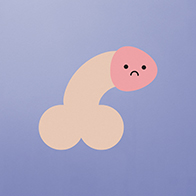Depression and ED Form a Debilitating Feedback Loop

Anyone who hasn't experienced severe depression probably struggles to fathom how it can infiltrate its tendrils into every aspect of your life.
One of the cruelest effects depression has on men is contributing to erectile dysfunction (ED). Even worse, ED and depression can form a negative feedback loop wherein each problem amplifies the other—especially if left untreated.
But therapists and men's health specialists can work in tandem to help men overcome both issues and break the cycle.
What's the link between depression and ED?
About 246 million people around the world suffer from depression. In the United States, about 8 percent of the adult population—more than 19 million people—suffers a major depressive episode in a given year, according to the National Institute of Mental Health (NIMH).
Worse, according to a 2018 meta-study published in the Journal of Sexual Medicine, men who suffered from depression had a 39 percent higher risk of also experiencing erectile dysfunction. Interestingly, the reverse was also true: Men with ED were nearly three times more likely to suffer from depression.
One major roadblock to a solution is that many men are reluctant to seek help—at least for the depression side of the equation.
"In my practice, what ends up happening is, because I advertise as a sex therapist, I have men coming to me for sexual dysfunction," said Jenn Bossio, Ph.D., a clinical psychologist and sex therapist who is the director of the Trihealth Clinic in Kingston, Ontario. "Then we dig a bit deeper, and a huge percentage of the time, it's either anxiety or depression."
Brain-body connection
At first glance, it might be difficult to imagine a link between sexual function and depression. However, a 2000 study published in American Family Physician indicated a whopping 70 percent of people with depression reported a lack of interest in sex when not taking medication. When you consider the lack of interest in sex itself can create stress for men, you shouldn't be surprised to learn that that specific stress might affect their sexual response even further.
Bossio helps her patients understand the link between brain and body in terms of depression and ED with an imagined internal monologue that may sound familiar to some men.
"The way we would talk about it would be, for instance, 'I'm feeling really low and so I'm not feeling a great deal of desire. And now my partner either wants to have sex, or I'm feeling less of a man because I haven't had sex in a while, so I probably should,'" Bossio said. "And what happens in the body is the stress starts to increase. And then the brain says, 'Uh-oh, am I going to be able to get an erection?' And then the body stress is getting higher, and the erection starts to go down. And the body says, 'Okay, here we go again.'"
Thinking about depression in terms of the stress it puts on a man's mind and body can really help drive home how erections are frequently affected. As anyone who fears public speaking can attest, mental stress and anxiety create physical changes: Thoughts, all by themselves, can alter your heart rate, breathing, muscle tension and more.
"If you were in the woods and you saw a bear, would you get an erection? Obviously, the answer is no, because the body is actually designed to, in a state of stress, constrict certain arteries to move blood away from them—for example, the penis—and move blood to areas like the legs, which you'll need to run away," said Petar Bajic, M.D., a urologist practicing with the Cleveland Clinic. "When we talk about the relationship between anxiety or stress and blood flow to the penis, it's a much smaller version of that."
Hello, ED. Welcome to my mind.
Another aspect of depression that can exacerbate erectile problems is the tendency to dwell. When we're depressed, we have the inclination to ruminate, to repeatedly go over a problem in our minds, often accompanied by motifs of our own uselessness or inadequacy.
For guys who experience bouts of ED, this kind of thinking is common.
"One of the big problems with depression is rumination," Bossio said. "So men are just going over and over and over [their ED]. And I'll ask them, 'How often are you thinking about your erection problem?' And I'll get answers of 98 or 100 percent of the time. How are you going to have a really good, calm, happy life if you're constantly considering this as a failure?"
How do we break the cycle?
If someone's depression is so severe they can't function, it usually is treated first before the ED, likely through antidepressant medication, Bossio said.
"But the majority of people I see, we end up treating the erectile difficulties first, because the skills that we use are totally transferable to depression," she said. "What I use is a three-pronged approach. It's some combination of mindfulness, cognitive behavioral therapy (CBT) and just pure sex therapy."
Mindfulness
Present-moment, nonjudgmental awareness can help men process their negative ruminations better.
"We just learn that whenever those painful thoughts come into our head, to say, 'Thank you brain, for that, I'm going to move on and do what matters anyway,'" Bossio said.
Cognitive behavioral therapy (CBT)
A therapist helps you learn how to challenge inaccurate or negative thoughts and rewrite them.
"Like if you think, 'Oh, I'm never going to be able to get an erection and my partner's going to leave me,' we'll rewrite that to, 'Sometimes, I am able to get an erection, but it can be hard when I'm so depressed,'" Bossio said.
Sex therapy
Bossio likes to introduce patients to the Sexual Response Cycle model created by Rosemary Basson, a clinical professor of sexual medicine at the University of British Columbia. The model helps patients understand that sex and erections aren't controlled by an on-off switch—they're more complicated than that, and the more areas a therapist can identify that might help or hurt the situation, the more knowledge they'll have to help the patient.
If you're suffering from either depression or ED, or both, seeking help from a therapist is probably the best first step toward using the tools you need to overcome it.
But until you do, trying a combination of mindfulness, CBT and learning about your sexual response cycle is certainly a worthwhile exercise.




















